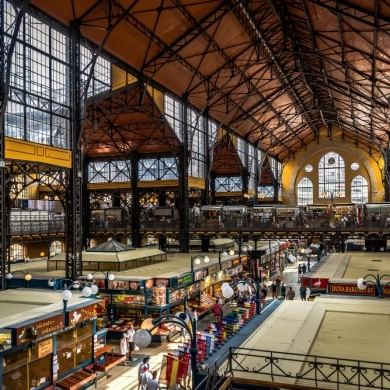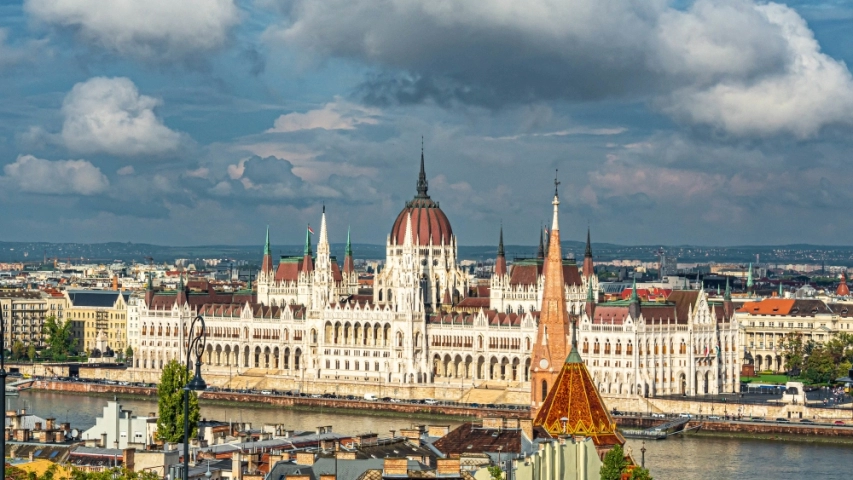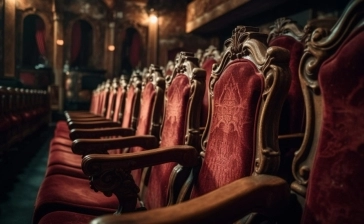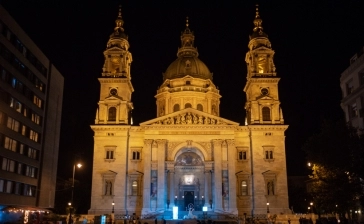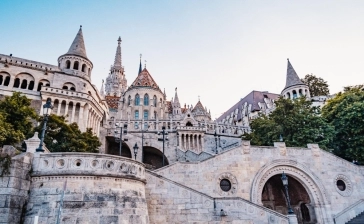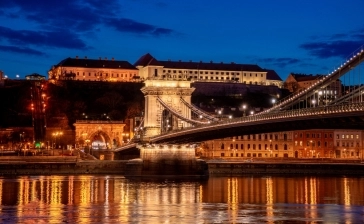Budapest, the capital of Hungary, is a city that offers a fascinating amalgamation of history, culture, and natural beauty. Known as the "Pearl of the Danube," Budapest has been a crucial meeting point throughout history, reflected in its diverse architecture and vibrant cultural life. For a person traveling in a wheelchair, Budapest offers a variety of accessible experiences that ensure a memorable and comfortable visit.
Budapest is divided by the Danube River into two parts: Buda and Pest. Buda, on the western bank, is hilly and filled with historic sites such as Buda Castle and Fisherman's Bastion. Pest, on the eastern bank, is flatter and hosts most commercial and cultural activities, including the Hungarian Parliament and Andrassy Avenue.
Regarding accessibility, Budapest has made significant efforts to improve it as much as possible. Many of its main attractions are accessible, and public transportation, including buses and metro line 4, is equipped to meet the needs of people with reduced mobility. It is advisable to check the specific accessibility of each place before visiting, as some old attractions may have limitations.
Places to visit:
Buda Castle: Although it is located on a hill, there are accessible options to reach the castle, such as the funicular or accessible taxis. Once at the top, the views of the Danube and Pest are breathtaking, and several parts of the castle are accessible.
Hungarian Parliament: It is one of Budapest's most iconic buildings. It offers accessible tours that allow wheelchair users to explore its majestic architecture and learn about Hungary's political history.
Széchenyi Thermal Bath: Budapest is famous for its thermal baths, and Széchenyi is one of the largest and most accessible. It features stair-free entrances and adapted changing rooms, although it is important to check for assistance availability before visiting.
As for public transportation in Budapest, it is relatively accessible. Buses have low floors and designated spaces for wheelchairs. The metro is less accessible, except for line 4, which is fully accessible. Accessible taxis are also available, although it is recommended to book them in advance.
Furthermore, you cannot miss the opportunity to immerse yourself in Budapest's rich culture. Visit historic cafes, try delicious Hungarian cuisine, and enjoy a night of classical or folk music. Many restaurants and theaters are accessible, but it's always best to confirm in advance.
We also want to provide you with some interesting information about the city, such as: Budapest has the honor of hosting the second oldest metro in Europe, after the London Underground. Line M1, known as the "Millennium Underground," has been in operation since 1896.
The Shoes on the Danube Bank: This touching sculpture on the banks of the Danube commemorates the Jews who were executed during World War II. It is an accessible place of reflection and memory that touches the hearts of visitors.
Chain Bridge: It is the oldest suspension bridge in Budapest and one of the city's icons. Although it was destroyed during World War II, it was faithfully rebuilt and is now an architectural marvel.
In conclusion, we can say that Budapest welcomes all its visitors with open arms. The combination of its rich history, vibrant culture, and accessibility efforts make it an ideal destination for wheelchair tourists. Plan ahead, communicate your needs, and prepare for an unforgettable experience in the heart of Europe.
Budapest boasts several tourist information offices scattered throughout the city and at the airport, providing visitors with access to valuable resources and information. These offices are located in key areas such as Ferihegy Airport (with offices in terminals 1, 2A, and 2B), Nyugati Palyaudvar train station, Buda Castle, among other strategic points in the city. These offices offer free maps, lists of activities, brochures, free magazines, and the sale of the Budapest Card, which offers numerous benefits such as free use of public transportation and discounts on attractions.
Here are the contact details and addresses of the most important ones:
Tourinform Office in the city center:
- Address: 2, Suto utca, 1052, Budapest, Hungary.
- Phone: 0036 1 4388080.
- Email: suto@budapestinfo.hu.
- Website: budapestinfo.hu.
- Opening hours: 8 a.m. to 8 p.m.
Tourinform Office near Heroes' Square in Pest:
- Address: Olof Palme sétány 5., district 14.
- Opening hours: Daily from 9am to 5pm
Budapest Liszt Ferenc International Airport, Terminal 2A:
- Opening hours: Daily from 8 a.m. to 10 p.m.
Budapest Liszt Ferenc International Airport, Terminal 2B:
- Opening hours: Daily from 10 a.m. to 10 p.m.
Budapest Card:
The Budapest Card is the official tourist card that offers numerous benefits for exploring Budapest, including free access and discounts on a wide range of attractions and services. With this card, you can enjoy free access to over 30 museums and attractions, as well as Lukács thermal baths. It also offers free guided tours of Buda and Pest, unlimited travel on the Castle District's official bus, and discounts of up to 50% on many other tours and attractions.
Among the free attractions are the Hungarian National Gallery, the Hungarian National Museum, the Budapest Museum of Fine Arts, and many more. It also offers discounts on admission to other thermal baths and activities such as Danube cruises.
The card is available in different versions, depending on the duration of validity: 24, 48, 72, 96, and 120 hours, with prices ranging from 33 euros for the 24-hour version to 92 euros for the 120-hour version. There is also a "Plus" version for 72 hours that includes additional benefits such as a Danube cruise and transfer to the international airport.
You can purchase the Budapest Card online or at various sales points in the city, including BKK customer service centers at major metro stations and at Liszt Ferenc Airport. It is important to note the start date and time on the card and sign it to validate it.
To make the most of the Budapest Card, it is recommended to plan your trip in advance, familiarize yourself with transportation options, and attraction schedules. If you need transfers from the airport, the 72-hour Plus version may be a good choice. Remember that the cards are non-refundable.
In summary, the Budapest Card can be an excellent investment if you plan to visit several attractions and use public transportation during your stay in Budapest.
Here are the contact details:
- Phone: (+36) 70 388 87 18
- Email: info@officialbudapestcard.com
- Website: https://officialbudapestcard.com/buy-budapest-card/
Airport:
Budapest Airport, officially known as Ferenc Liszt International Airport, offers a comprehensive range of services and facilities to ensure that passengers in wheelchairs and those with reduced mobility have a comfortable and accessible experience during their time at the facilities.
To begin with, the airport features clearly marked assistance points located in various areas, where passengers with reduced mobility can request help and guidance. These service points are equipped to provide assistance from arrival to departure or during flight connections, ensuring a smooth and secure transition through the airport facilities.
In terms of physical facilities, the airport is designed to be fully accessible for wheelchair users. This includes access ramps, spacious elevators with low-height controls, and adapted restrooms in all areas of the airport. Rest and waiting areas are also designed to ensure comfort and accessibility, with suitable seating and reserved spaces for wheelchair users.
Ground assistance service is available to help wheelchair passengers during boarding and disembarkation from aircraft. This service must be requested in advance through the airline with which you are traveling, ensuring that staff are prepared and available to provide necessary assistance at the right time.
For mobility within the airport, there are adapted transport services that facilitate movement between terminals, as well as to and from aircraft. Vehicles are equipped to accommodate wheelchairs, ensuring a comfortable and safe transfer for all passengers.
In terms of signage, Budapest Airport features clear and legible signs designed to help passengers navigate the facilities with ease. Information and directions are available in multiple languages, including Braille signage for visually impaired individuals.
Additionally, the airport offers additional services to ensure a pleasant experience for all passengers. This includes customer service and support areas, where additional information and specific assistance related to accessibility and other special requirements can be obtained.
In summary, Budapest Ferenc Liszt International Airport is committed to providing an accessible and welcoming environment for wheelchair passengers, ensuring that all travelers can enjoy a stress-free and comfortable journey, with access to all necessary facilities and services.
Transport from the Airport to the City Center:
For wheelchair travelers wishing to travel from Budapest Airport to the city center, there are several transportation options tailored to their needs:
Accessible Taxi:
The most direct and comfortable option is to take an accessible taxi. Several taxi companies operate at the airport with vehicles equipped to transport wheelchair passengers. It is advisable to book this service in advance to ensure availability. Taxis have regulated fares, so the price to the city center should be fixed or based on a certified taxi meter.
Here are a couple of companies that have accessible taxis and provide transportation from the airport to the center of Budapest:
BUD Taxi: Offers a variety of vehicles, including MPV vans and mini buses that could accommodate various accessibility needs. They provide a meet-and-greet service, ensuring that a professional driver will greet you in the arrivals hall and assist you with luggage. You can request specific services and make reservations directly through their website.
Főtaxi: This is the official taxi company of Budapest Airport, located just outside the terminals. They offer taxi services 24/7 to and from the airport. Although they do not specify having adapted vehicles, they are a major provider and may be able to accommodate special requests.
Bus:
Bus service 100E connects the airport with the center of Budapest (Deák Ferenc tér). These buses are equipped to accommodate wheelchair passengers. The service operates with a frequency of every 20-30 minutes, and the ticket may have an additional cost on top of the regular public transportation price in the city.
Train:
Although there is no direct train connection from the airport to the city center, passengers can take a bus to the nearest train station and then take a train to the center. Trains and stations are equipped to be accessible for wheelchair passengers. (We do not recommend this option if you are in a wheelchair or have reduced mobility.)
Shuttle or Minibus Service:
Some shuttle or minibus services offer accessible vehicles by prior reservation. These services can be shared or private and represent a good alternative for groups or those looking for a door-to-door service.
Transport within the City:
In Budapest, efforts to improve accessibility in public transportation have been significant, facilitating the mobility of people with reduced mobility, including wheelchair users. Below are the adapted transportation methods available in the city:
Metro:
Budapest has four metro lines, of which line M4 is the most modern and fully accessible for wheelchair users. The other lines, M1, M2, and M3, have undergone accessibility improvements, although it is important to verify the specific accessibility of each station as it may vary. Accessible stations are equipped with elevators and ramps.
Trams:
Budapest's tram network is one of the most extensive in Europe. Many of the lines use modern, low-floor trams, facilitating access for wheelchair users. Specifically, lines such as 4 and 6, which run along the Grand Boulevard, offer good accessibility.
Buses:
Most buses in Budapest are low-floor and equipped with ramps, making it easy for wheelchair users to board and alight. Additionally, many of them have designated wheelchair areas.
Trolleybuses:
Like buses, trolleybuses in Budapest are adapted to be accessible for people with reduced mobility. They have low floors and space to accommodate wheelchairs.
Accessible Taxis:
There are taxi services in Budapest that offer vehicles equipped for wheelchair users. It is advisable to book these taxis in advance.
Here are a couple of companies that have accessible taxis and provide transportation from the airport to the center of Budapest:
BUD Taxi: Offers a variety of vehicles, including MPV vans and mini buses that could accommodate various accessibility needs. They provide a meet-and-greet service, ensuring that a professional driver will greet you in the arrivals hall and assist you with luggage. You can request specific services and make reservations directly through their website.
Főtaxi: This is the official taxi company of Budapest Airport, located just outside the terminals. They offer taxi services 24/7 to and from the airport. Although they do not specify having adapted vehicles, they are a major provider and may be able to accommodate special requests.
Boats:
Ferry service on the Danube River is also an option to enjoy the city from another perspective. Some of these boats are adapted for people with reduced mobility.
In Budapest, there are several options for Danube River cruises that are wheelchair accessible:
Budapest River Cruises:
Offers "Cruise & Guide" programs with boats like the Gondola, which have partial wheelchair access. These boats have an accessible lower deck, although the bathrooms may not be at the same level, which could limit access depending on the boat. It is recommended to contact them directly for specific details and to ensure accessibility before booking. You can contact them through their website for more details and recommendations.
Legenda Sightseeing Boats:
Offers a guided cruise experience that is accessible for wheelchairs. This cruise allows you to enjoy panoramic views of Buda Castle, the Hungarian Parliament Building, and other iconic landmarks along the Danube. They also offer the option to disembark at Margaret Island for exploration and then reboard the boat for the return journey.
Both services are viable options and offer stunning views of the city from the river, along with adapted services to ensure the comfort and accessibility of all passengers. I recommend contacting the companies directly to confirm specific accessibility details and make any necessary arrangements before your visit.
Jewish Quarter:
The Jewish Quarter of Budapest, located in the city's 7th district, is one of the most vibrant and culturally rich areas, offering a unique blend of history, art, gastronomy, and nightlife. For a wheelchair user wishing to explore this fascinating area, it is essential to know the accessibility facilities, as well as the points of interest that make this neighborhood a must-visit destination.
At the heart of the Jewish Quarter is the Great Synagogue of Budapest, also known as the Dohány Street Synagogue, the largest in Europe and the second largest in the world. This majestic Moorish-style building offers accessibility for wheelchair users, allowing all visitors to admire its impressive interior and gain a deeper understanding of the history of the Jewish community in Budapest. Near the synagogue is the Jewish Museum, which houses an important collection of religious artifacts and exhibits on Hungarian Jewish history, also accessible to visitors with reduced mobility.
In addition to the Great Synagogue, the Jewish Quarter is home to other smaller synagogues and historical sites, such as the Rumbach Street Synagogue and the Kazinczy Street Synagogue. While accessibility may vary, specific information can be obtained by contacting the venues in advance or consulting online resources dedicated to accessibility in Budapest.
As you walk or move through the streets of the neighborhood, wheelchair users will notice that many sidewalks have been renovated to improve accessibility, although areas with cobblestones or unprocessed curbs may still be encountered. It is advisable, if possible, to be accompanied to facilitate access to some less accessible places.
The Jewish Quarter is not only a place of historical and religious significance but also a center of contemporary culture and nightlife. The area is famous for its "ruin bars," unique bars located in old and abandoned buildings that have been transformed into vibrant spaces full of life. While the accessibility of these bars varies, many have made efforts to be inclusive to all visitors, offering adapted entrances and internal facilities for people in wheelchairs.
The culinary offer in the Jewish Quarter is equally attractive, with a wide variety of restaurants serving everything from traditional Jewish cuisine to international dishes. Some of these establishments are equipped to accommodate wheelchair users, with suitable entrances and adapted bathrooms, ensuring a comfortable and enjoyable culinary experience.
For those interested in art and culture, the neighborhood offers galleries, art shops, and cultural spaces, many of which are accessible. Additionally, the area is dotted with murals and street art, adding a vibrant backdrop to the rich cultural tapestry of the neighborhood.
In terms of accommodation, the Jewish Quarter has a range of hotels and tourist apartments that offer rooms and services adapted for people with reduced mobility. When choosing a place to stay, it is advisable to check the accessibility specifications and services offered to ensure a comfortable and worry-free stay.
To get around the neighborhood and the city in general, wheelchair users can make use of Budapest's public transportation system, which includes buses, trams, and the metro, many of which are accessible. In addition, accessible taxis are available in the city and can be a convenient option for direct transfers to specific points of interest.
In summary, Budapest's Jewish Quarter is a fascinating destination that offers a wide range of experiences, both cultural and historical, culinary, and leisure, all of which can be enjoyed by visitors in wheelchairs with proper planning.
Óbuda District:
The Óbuda district, located in the third district of Budapest, is an area rich in history, culture, and charm, offering a unique experience for visitors, including wheelchair users. This ancient district, whose name means "Old Buda," stands out for its relaxed atmosphere and rich heritage, differentiating itself from the hustle and bustle of the city center.
Óbuda is home to Roman ruins, historical buildings, and charming squares, offering a glimpse into Budapest's past. For a wheelchair tourist, exploring Óbuda involves discovering its accessibility and planning to enjoy a complete and hassle-free experience.
One of Óbuda's main attractions is the archaeological site of Aquincum, which was an important military and civilian center during the Roman Empire. Although the terrain may be somewhat challenging in some areas for wheelchair users, many areas of the archaeological park are accessible, and the museum offers adapted facilities, including accessible bathrooms and ramps, allowing wheelchair users to explore the exhibits and learn about the Roman history of the region.
The heart of Óbuda is the main square, Fő tér, surrounded by carefully restored historical buildings. This area is relatively accessible, with flat sidewalks and ramps at various points. The square hosts events and markets throughout the year, offering visitors a taste of local culture in an accessible environment.
In Óbuda, you will also find the Kiscelli Museum, located in a former Baroque monastery on Kiscelli Hill. This museum offers exhibitions of local art and history, and although access to some areas may be limited for wheelchair users due to the age of the building, the museum strives to be as accessible as possible, with staff willing to assist visitors.
The gastronomy in Óbuda is another of its attractions, with numerous restaurants and cafes serving everything from traditional Hungarian dishes to international cuisine. Many of these establishments are equipped to accommodate wheelchair users, with suitable entrances and adapted bathrooms, although it is always advisable to check specific accessibility before visiting.
For those interested in local architecture and history, Óbuda offers a charming stroll through its cobblestone streets, although it is important to note that some areas may present challenges in terms of accessibility due to the historical nature of the neighborhood. Nevertheless, the main streets and attractions are usually well prepared to receive visitors with reduced mobility.
In terms of transportation, Óbuda is accessible via several bus and tram lines that have vehicles adapted for wheelchairs, facilitating access to and from other parts of Budapest. Additionally, accessible taxis are a viable option for direct travel within the district.
Accommodation in Óbuda is varied, ranging from modern hotels to more traditional accommodations. For wheelchair visitors, it is crucial to select accommodation that offers adequate accessibility facilities, ensuring a comfortable and obstacle-free stay.
Exploring Óbuda offers a different perspective of Budapest, away from the hustle and bustle of the more touristy districts, and provides wheelchair visitors with the opportunity to immerse themselves in an environment full of history, culture, and natural beauty, all accessible with careful planning and attention to specific accessibility needs.
Gerbeaud Café: https://gerbeaud.hu/
Gerbeaud is a famous café and pastry shop located in Budapest, Hungary. Founded in 1858 by Henrik Kugler, it has become an iconic institution in the city, known for its delicious pastries and elegant atmosphere.
Gerbeaud Café offers a wide variety of cakes, desserts, coffee, tea, and other beverages. It also serves savory dishes such as sandwiches and salads. Additionally, it has a shop where gourmet products and souvenirs can be purchased.
The venue is accessible to people with reduced mobility.
Opening hours: Monday, Thursday, and Sunday: 09:00 AM – 08:00 PM Friday and Saturday: 09:00 AM – 09:00 PM
Address and contact:
• Vörösmarty tér 7-8., Budapest, Hungary
• Phone: (+36) 1 429 9000
• Email: gerbeaud@gerbeaud.hu
Restaurant La Nube: https://www.lanubebp.hu
Restaurant La Nube is a restaurant located in Budapest, Hungary. It offers a unique gastronomic experience with a blend of international and local cuisine in an elegant and modern atmosphere.
On the menu of Restaurant La Nube, you can find a variety of dishes ranging from local specialties to contemporary culinary creations. In addition to food, the restaurant offers a wide selection of Hungarian and international wines, as well as cocktails and other beverages.
The restaurant is accessible to people with reduced mobility.
Address and contact:
• 114 Budapest, Bartók Béla út 41.
• Phone: (+36) 20 439 5101
• Email: hola@lanubebp.hu
Restaurant Beerstro 14: https://www.beerstro14.hu/
It is a bubbly Steak House in the heart of Budapest, with an infinite thread of meat connecting everything and everyone.
In this restaurant, the dishes are tastefully composed, the steak comes with garnishes and sauces according to the season or flavor. They also offer excellent craft beers on tap, an impressive wine list, and eye-catching cocktails.
Their slogan is: GOOD FOOD, GOOD BEER, GOOD PEOPLE.
The restaurant is accessible to people with mobility problems or wheelchairs.
Opening hours: Monday 12:00 PM – 11:00 PM Tuesday to Sunday 12:00 PM – 04:00 PM and 05:00 PM – 11:00 PM
Address and contact:
• 1053 Budapest, Károlyi street 12.
• Phone: (+36) 70 551 3599
• Email: beerstro14@gmail.com
